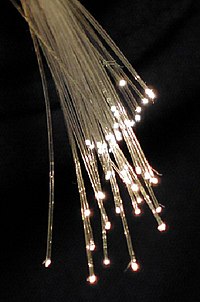
Photo from wikipedia
Aramid Fibre Reinforced Plastic composites are difficult to be drilled due to anisotropic material properties. Currently, soft computing techniques are used as alternatives to conventional mathematical models, which is robust… Click to show full abstract
Aramid Fibre Reinforced Plastic composites are difficult to be drilled due to anisotropic material properties. Currently, soft computing techniques are used as alternatives to conventional mathematical models, which is robust and can deal with inaccuracy and uncertainty. In this paper, drilling of Aramid Fibre Reinforced Plastics (AFRPs) was carried out using Taguchi L54 experimental layout. Drilling tool used in this experiment was solid carbide. The purpose of this study was to find optimum combination of drilling parameters to obtain minimum thrust and torque force to reduce the delamination. Also, this paper proposed a prediction model of Multilayer Perception Neural Network optimized by Genetic Algorithm (MLPNN-GA). Moreover, RSM technique was used to evaluate the influence of process parameters (spindle speed, feed rate, drill point angle and drill diameter on thrust force and torque. The prediction capability of both RSM and MLPNN-GA was compared with Response optimizer for thrust force and torque. The investigation demonstrated that drill point angle is the primary factor affecting thrust force and drill diameter influences the torque force on the drill bit. Overall, this study recommends the use of high speed and low feed combination and drill point angles of 90°–118° to reduce the delamination of the materials in the drilling of AFRP composites.
Journal Title: Heliyon
Year Published: 2018
Link to full text (if available)
Share on Social Media: Sign Up to like & get
recommendations!